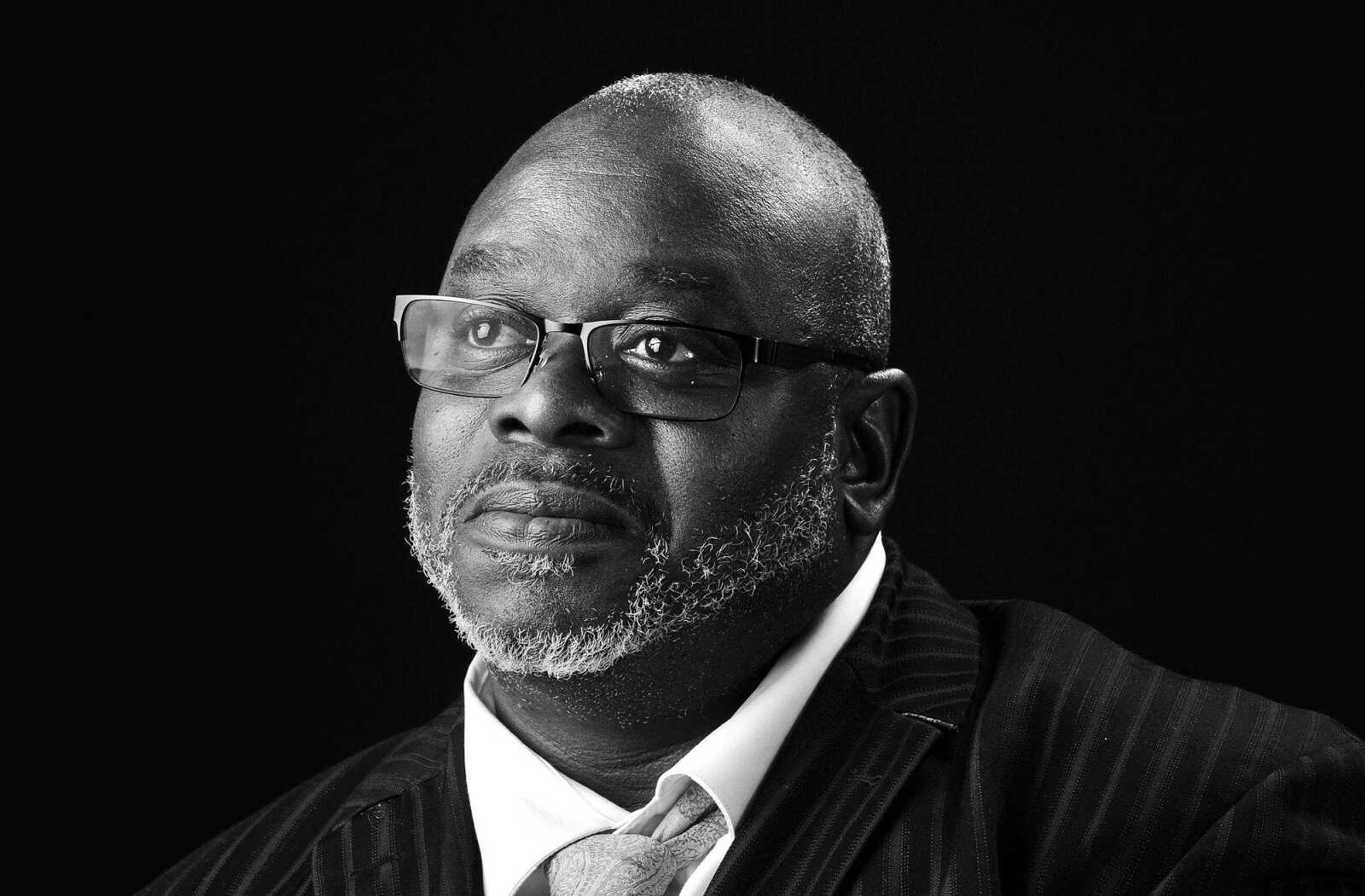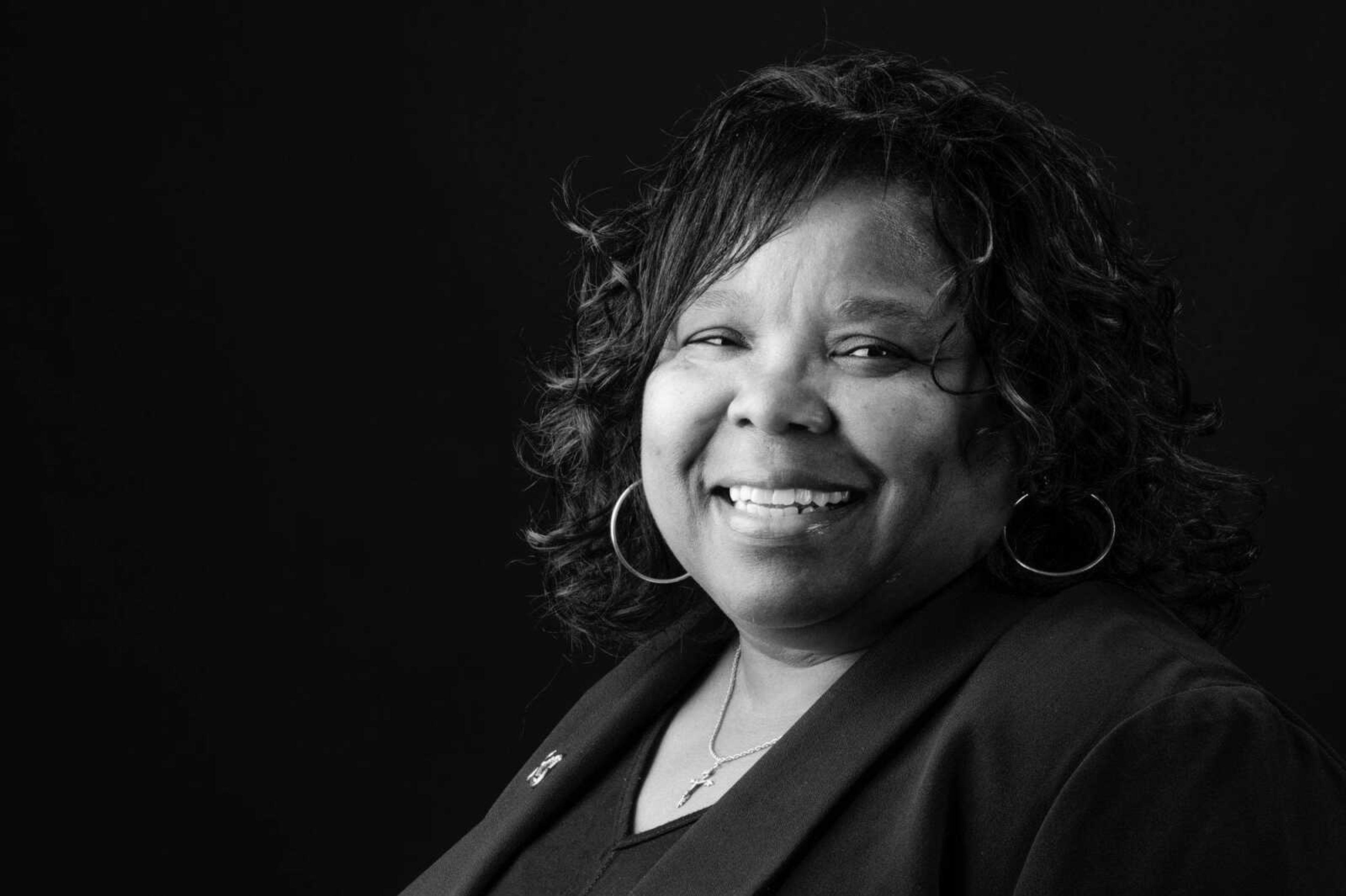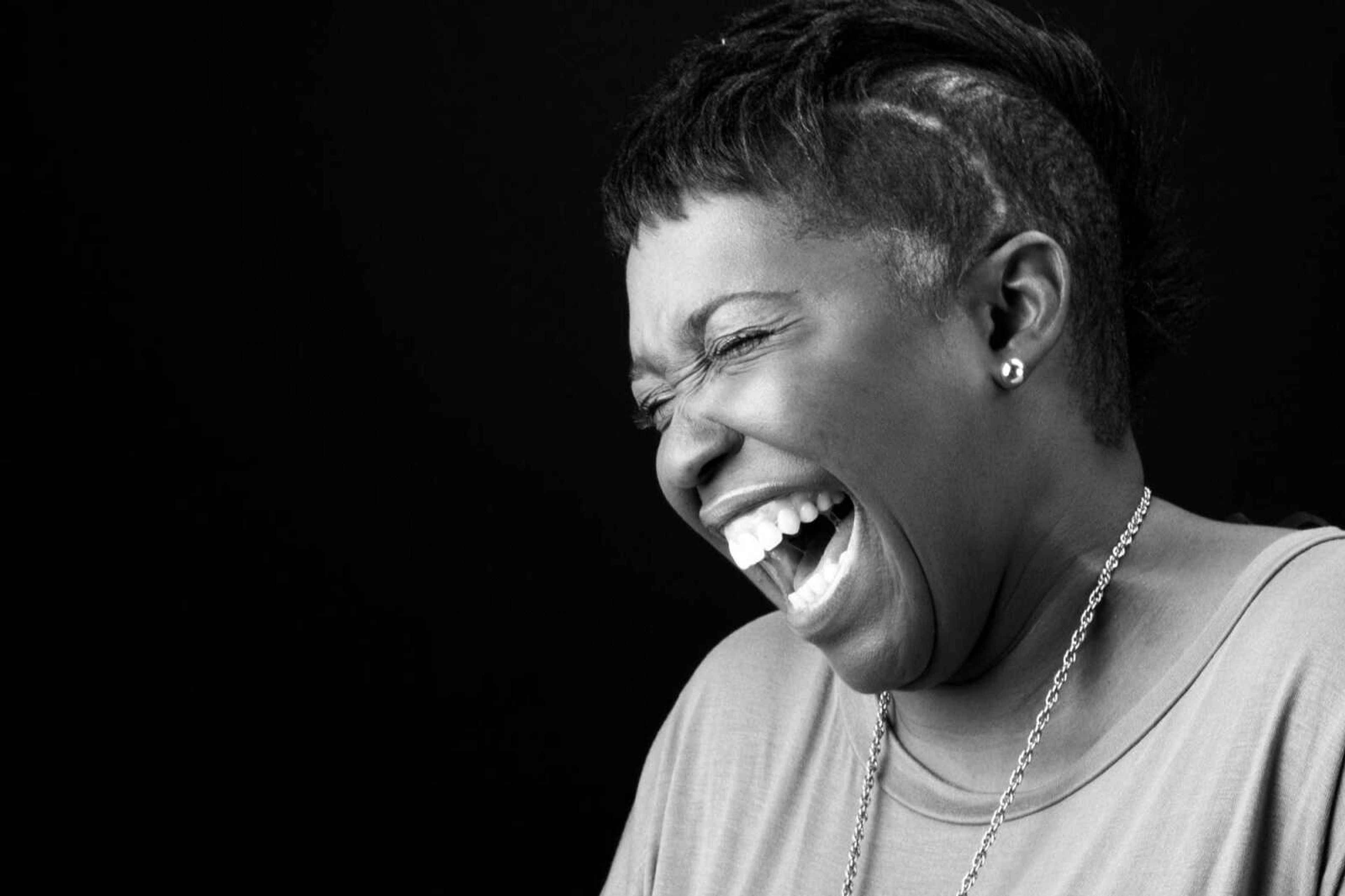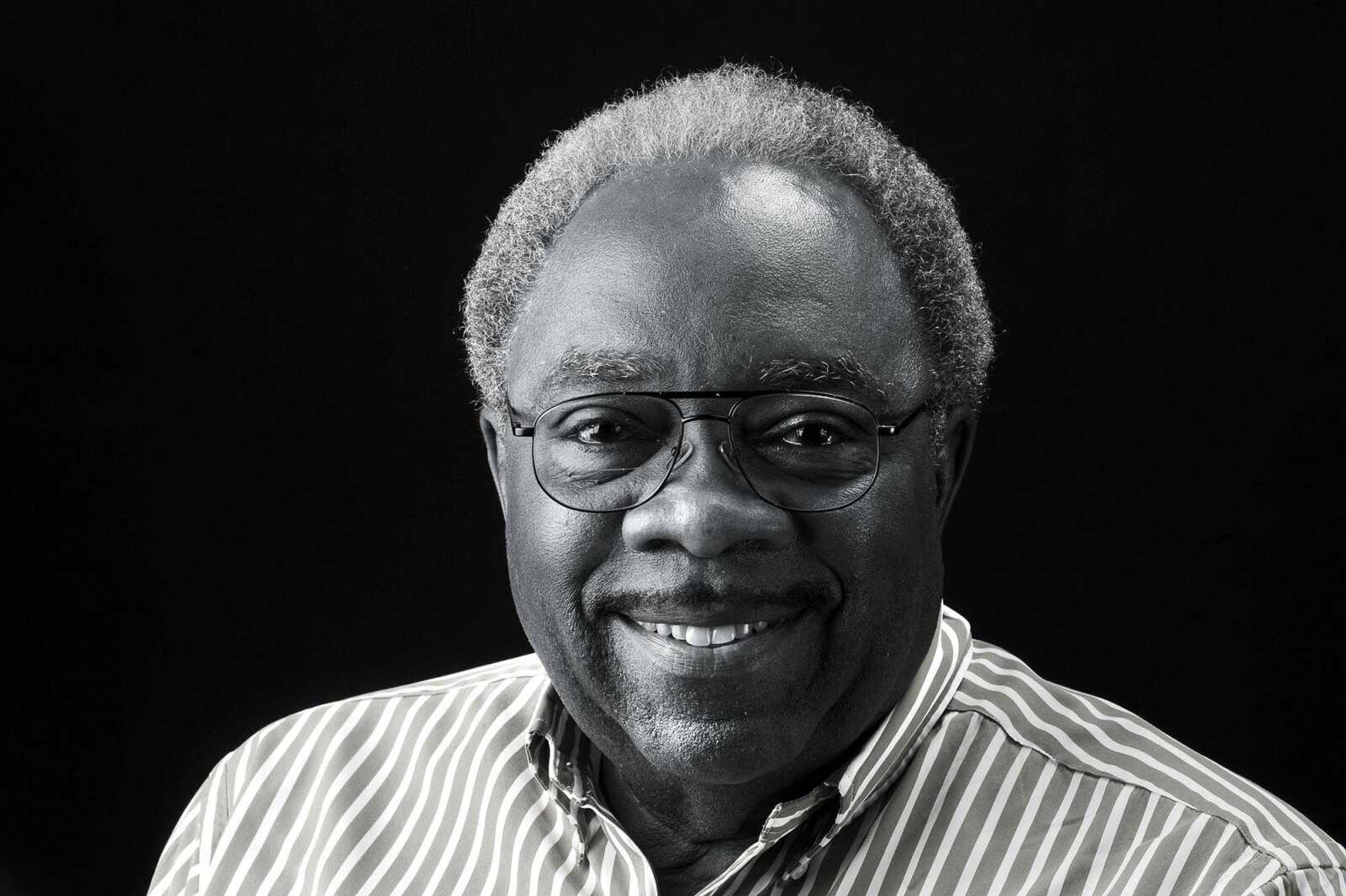In celebration of Martin Luther King Jr. Day, we interviewed African-Americans in the community who work hard to give of their time, talents and hearts to help make the city and region a better place. Space has prevented us from featuring every deserving person in the area, but we hope readers take something special from the conversations below. Had he lived, Dr. King would have turned 87 this year. In many ways, the stories below show how his dream lives on inside the people his influence has touched and the many his legacy will continue to touch into the future.
The Rev. Byron Bonner

The Rev. Byron Bonner lives in the presence of God. He absorbs it from the pages of his Bible, sees it at work in his surroundings and shares it at every opportunity, whether with members of his congregation at True Vine Ministries in Cape Girardeau or with men and women he approaches on the streets.
It doesn't matter whether his listeners are dressed in their Sunday best or wearing guns. Bonner isn't afraid. He makes it his business to stop and chat wherever he is and with whomever he finds. He acknowledges strangers he meets as human beings first, and if possible, introduces them to Jesus, a man he said he believes delivered him from a crippling, yearslong drug addiction in the blink of an eye.
At his lowest point, Bonner decided enough was enough and uttered this biblical passage from James 4:7: "Submit yourselves, then, to God. Resist the devil, and he will flee from you."
That was all it took, and he was healed.
Since then, Bonner has extended the olive branch of God's love to those most in need of it.
"This is what has propelled me into the community," he said.
Bonner began True Vine in a storefront Oct. 7, 2007. After about a year, it began getting crowded, so he prayed for something that could accommodate his growing flock. That's when he landed at the building the church occupies at Park Avenue and Bloomfield Street. It can seat up to 140, and "we're starting to pack back up every Sunday."
In honor of Martin Luther King Jr. Day, we asked Bonner what inspires him.
What motivates you to contribute to the local community?
Believe it or not, I was a taker from the community at one time. I'm a delivered drug addict. I was on drugs for about 14 years, and I got worse and worse and worse. ... But I said, "I know the Lord has created me to do something better than this."(When I repeated the passage from the book of James), it was the power of God that came over me. I knew right then and there, it was the power of God.
Who is your biggest role model or models?
T.D. Jakes. He's a bishop and a really successful pastor. It's because of the style of teaching he does and the way he started is so similar to the way we started. He's in Dallas, Texas, now, but he started out in a small town in West Virginia.
When I say the name Dr. Martin Luther King Jr., what comes to mind?
What comes to mind was a true man who wanted better things for the community and for his people. ... Back then, they shot water on the blacks, they hung them, they served them out of the back door ... but what I admire is, they never stopped singing "Amazing Grace." They never blamed God for what was happening to them.
How much influence did the great civil-rights leader have in your life?
When I think about Martin Luther King, I think of his dream. When I look back and see what he as a forerunner has done, he paved the way for us now. We have certain rights and abilities now, and (the members of the civil-rights movement) stood as pillars. ... It's such a beacon of light in my life to think that they didn't give up.
Carol Drummond

It took 15 years of military service to get to college, but Carol Drummond used her G.I. Bill benefits to earn a degree in family life with a minor in social work from Southeast Missouri State University.
She works as a veterans' representative at the state Division of Workforce Development's Cape Girardeau office -- a job she's been doing since May 1, 2006, first in Sikeston, Missouri, and now here.
"I never dreamed that I could be a veterans' representative for the state," she said.
In a way, it's a job she had trained for almost all her professional life. In the Army, she worked as a medical-supply specialist, which made her want to focus on social work more. Then one of her first jobs out of college was working as a contractor for MERS Goodwill, helping young, single mothers go from public assistance to independence.
"I had a lot of them to go to college," she said, beaming.
Drummond's focus now is helping veterans find jobs once they've found housing or finished job training.
"So the barriers are met with first and then when they're job ready, my job is to go out to employers on their behalf," she said.
Drummond hosts a number of job fairs each year at employment centers in Cape Girardeau, Sikeston, Poplar Bluff and Kennett, Missouri. She estimated her office has helped hundreds of veterans over the years.
In honor of Martin Luther King Jr. Day, we asked what has shaped her perspective.
What motivates you to contribute to the local community?
I really liked my job in the military. I feel like that was a very good job to get me out in the community, and I got my degree, and I thought, "I want to give back." ... I think it's just my calling, to help people.
Who is your biggest role model or models?
When you say role models, there are so many. But I have to say Maya Angelou, who recently passed. And Oprah. When she had her show, I always thought I would be on it.
When I say the name Dr. Martin Luther King Jr., what comes to mind?
That (he and the members of his movement) walked across that bridge in Selma, and I know they had to be scared. But I am from Louisiana ... and my mom and dad always tried to keep us safe. They said, "You can look at things on TV, but do not go out and start trouble."
How much influence did the great civil-rights leader have in your life?
The desegregating of schools -- when that law passed, we were the first ones to be bused to the white schools. When I got to that school (in my junior year in high school), they had better books, they had better everything. And that really helped a lot.
Nita DuBose

On the desk in Nita DuBose's office at Cape Girardeau Central High School, a small plaque shaped like a boulder proclaims, "I can do all things through Him who strengthens me."
The passage from Philippians 4:13 sits amid colorful throw pillows and walls covered with photos of students, past and present. Bonnie Raitt's "Love Sneakin' Up on You" pours gently from the stereo system in the corner, and if nothing else, it's an anthem for the day. This is a space where love rules.
DuBose, who taught advanced-placement physics -- a program she founded -- for 10 years at Central, has been a guidance counselor for the last seven. If transitioning from the precise, calculating world of advanced mathematics to the imprecise world of hopes and dreams seems like a stretch, it isn't. Not to DuBose.
She decided to go back to school and earn her master's degree in school counseling because she wanted to do something different, and being a religious person, she said, "I just felt like this is what God called me to do."
Although she admitted to crying when she left the classroom, it was time for a change. It's a change that's been good.
"I'm very blessed, I really am," she said, writing in an email: "My greatest accomplishment as a school counselor is building and sustaining caring relationships with students, parents, colleagues and members of the community."
In honor of Martin Luther King Jr. Day, she spoke with us about her life and work.
What motivates you to contribute to the local community?
I think primarily it's (because) I love helping other people.
Who is your biggest role model or models?
For me, I know for sure -- it's my faith in God. My parents also have been instrumental in my life. My dad (Fred Johnson, former basketball player and coach for Oran) encountered a lot of problems playing at Oran and going to the Final Four. There was a lot of racism back then. But my parents didn't tell those stories until later, and I was able to have my own experiences and form my own opinions.
When I say the name Dr. Martin Luther King Jr., what comes to mind?
The first thing that comes to mind is that I was the first recipient of the Dr. Martin Luther King scholarship at Southeast Missouri State University. He touched me in a way I never would have imagined.
How much influence did the great civil-rights leader have in your life?
I did learn about Dr. Martin Luther King in high school and in college. But I would say personal experiences shared by my family members put into perspective King's impact on my life today. I have a place and a voice in this world because of Dr. King's vision for humanity, and I am truly grateful and try not to ever take it for granted.
Steve Williams

Steve Williams remembers a time when restrooms said "whites only" and "blacks only" and meals had to be picked up by the back doors of restaurants. He remembers a school choir trip in the 1950s when he and the other children -- he was the only African-American in the group -- stopped at a Howard Johnson's for a meal but were told Williams couldn't be served.
So their choir director packed everyone up and moved to more hospitable environs.
"He was a good guy," Williams said.
Williams, the city of Cape Girardeau's housing assistance coordinator for about 30 years, remembers the day in 1968 when Dr. Martin Luther King Jr. was assassinated. At the time, Williams was serving as an Army sergeant in Germany and had to help keep the peace on the base when some of the soldiers heard the news. It was an ordeal that continued for about a week.
Williams remembers lots of things. He's seen and heard and lived many others, such as building Cottonwood Residential Treatment Center in Cape Girardeau and having been instrumental in saving downtown's iconic Marquette Building. But anyone who knows or works with him knows Williams is a humble man. He's not one to boast and is reluctant to reminisce. He doesn't cling to slights or view the world negatively. He puts one foot in front of the other.
"You get it; you do it," he said. "When it's finished, you move onto something else. You can't dwell in the past. You have to look to the present and toward the future."
In honor of Martin Luther King Jr. Day, we talked with Williams about why he does what he does.
What motivates you to contribute to the local community?
The job that I do as housing assistance coordinator is to go and find funding from different sources that we take back to our older neighborhoods, and we restore those older neighborhoods. We've had a total of nine community development block grants over the years -- seven on the south side of town and two on the north side of town. And with these programs, we not only did repairs on the housing, but we updated the infrastructure. I enjoy being able to go into neighborhoods and assist folks, to improve their quality of life.
Who are your biggest role models?
First of all, it's always your parents -- parents and grandparents. (They taught me) everything -- life in general and how to get along with your fellow man.
When I say the name Dr. Martin Luther King Jr., what comes to mind?
What comes to mind is a combination of all the efforts over the years by African-Americans that was always there, and what he did with his movement to bring everything into culmination, for African-Americans to be realized and recognized for all their contributions. And the culmination was Lyndon Johnson passing the Civil Rights Act (of 1964).
How much influence did the great civil-rights leader have in your life?
(He is) why I'm able to sit here and talk to you right now. I never think about it, but I am the only black male face at city hall heading a program. I'm here because I'm able to make a difference by doing some of things I do. And it's not just me; there are a lot of people out there.
Jill Young

After working for a quarter-century as an engineer, Jill Young decided to come out of retirement and teach. It's not something she had to do, but wanted to do.
"The first day (of classes), I always tell my students, 'I want you to learn something,'" she said, adding, "'preferably on topic.'"
Young is an instructor of statistics and information systems in the accounting department at Southeast Missouri State University. She also is a faculty sponsor for Alpha Phi Alpha, the fraternity of which Dr. Martin Luther King Jr. was a member in his day.
Originally from San Francisco, Young has taken to Cape Girardeau's slower, more welcoming pace over the years.
"When I go back to (the city), when I get to a stop sign, people go around me," she said, laughing.
As long as she can get her urban fix every now and then, she's perfectly happy to live in a lower gear.
"Frankly, I'm OK with that," she said.
She also is happy to nudge her students in a direction that will help them think critically about their careers and the directions they want to take in their lives.
This is what she had to say in honor of Martin Luther King Jr. Day.
What motivates you to contribute to the local community?
Education, literacy, elevates the entire community. So in that respect, being a vehicle where that can happen and being able to direct that conversation, where students can collaborate ... that, too, is educational and helps people grow. I enjoy it.
Who are your biggest role models?
I'm a Christian, so that comes first. Actually, I would (refer) to an institution as an opportunity for education.
When I say the name Dr. Martin Luther King Jr., what comes to mind?
"I Have a Dream." I saw the speech on TV. And, you know, the first time I went to Washington, D.C. (and the Lincoln Memorial), I thought, that many people were there (to hear the speech). That whole speech and all he represented -- and now we have the first black president of the United States.
How much influence did the great civil-rights leader have in your life?
He just opened the doors. Brown vs. Board of Education in 1959. (The movie) "The Help." He made all those things possible. He gave us a voice.
Scott McMullen

Scott McMullen's road to success was paved by hardship. Growing up in a poverty-stricken, single-parent household, McMullen raised his younger siblings in a dangerous environment.
"I grew up in a drug house, so my whole life I was around the drug culture," he said. "There'd be thousands of dollars of drugs in my house, but no food."
With encouragement and support from his community, he broke the cycle of poverty. His story illustrates the difference parents can make in the lives of children other than their own.
McMullen now is principal of Central Academy in Cape Girardeau. McMullen shared some of his experiences with us as we celebrate Martin Luther King Day.
What motivates you to contribute to the local community?
I was an at-risk student growing up. I faced a lot of the same challenges my students face. There were people along the way who showed me a different life. The importance of family values, being available and accessible to your children -- those are things I learned from people outside of my family.
Who are your biggest role models?
Being an at-risk student, I didn't know any other life. I transferred to Hawthorne [now Clippard Elementary School] in fourth grade. I was fortunate to become friends with [families that] taught me the importance of doing homework and getting an education. Those types of things were foreign to me, and it was an eye-opening experience. [For example,] Mr. and Mrs. Lee Cobb [built] a very loving, interactive family. The parents, either one or both, were always around, which was different for me. Mrs. Blattner [showed] me a home environment that was very relaxed. They had meals together; they did things as a family. I wasn't accustomed to those types of things. Richard Cuba took a chance on me. I wasn't very polished, and he trusted me with working at his preschool. He allowed me to find what my passion in life would be and showed me a trust that no one had ever shown me before. My elementary principal, Charles Clippard, established such a culture in his building that I never felt different [as a minority]. Looking back as an adult, [I realize] he probably made sure that was a priority. And my maternal and paternal grandmothers. Both of them grew up in the South, they were ethnic minorities, and school wasn't a priority. It helped perpetuate the life of poverty they lived growing up. They didn't want that for me, and they knew that my ticket out of poverty would be getting an education.
When I say the name Dr. Martin Luther King Jr., what comes to mind?
I think of "humanitarian." He set the stage for equality not just based on race, but for other advocates for other groups that were oppressed in our society for so long. [And] I think of "sacrifice." Someone who sacrificed his life, his ambitions, for the betterment of all people.
How much influence did the great civil-rights leader have in your life?
A great deal of influence. I think about all the sacrifices (he and others) made. Sacrificing the safety of themselves so that I could have the opportunity to receive the best education. It ... opened doors for me to have a variety of different pathways, as opposed to maybe just blue-collar jobs. They also created opportunities for me to have interpersonal relationships with people from all different backgrounds, not just one or two specific backgrounds.
Connect with the Southeast Missourian Newsroom:
For corrections to this story or other insights for the editor, click here. To submit a letter to the editor, click here. To learn about the Southeast Missourian’s AI Policy, click here.






